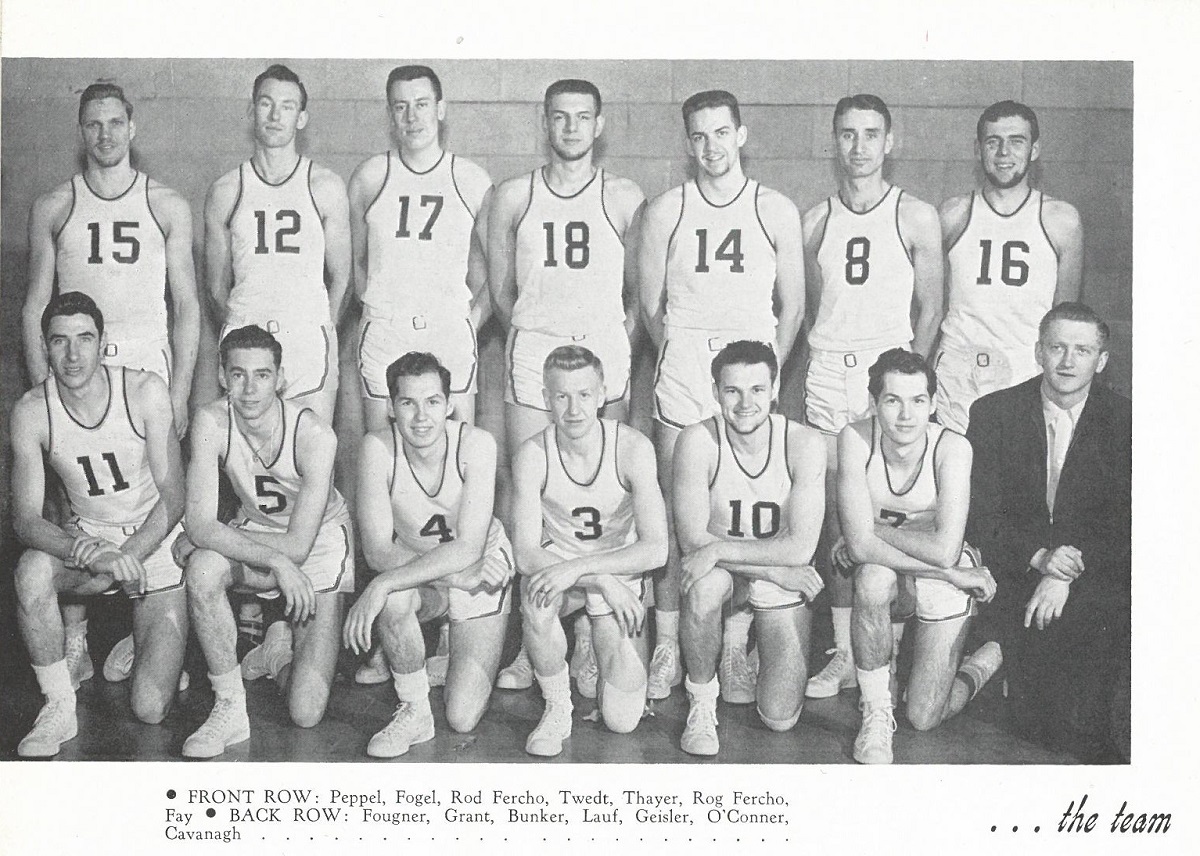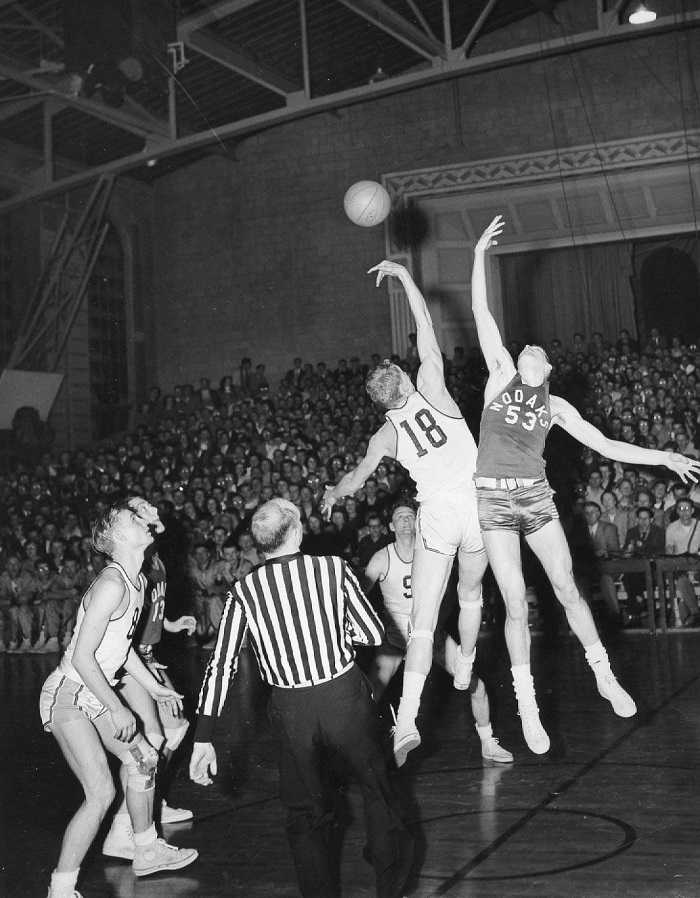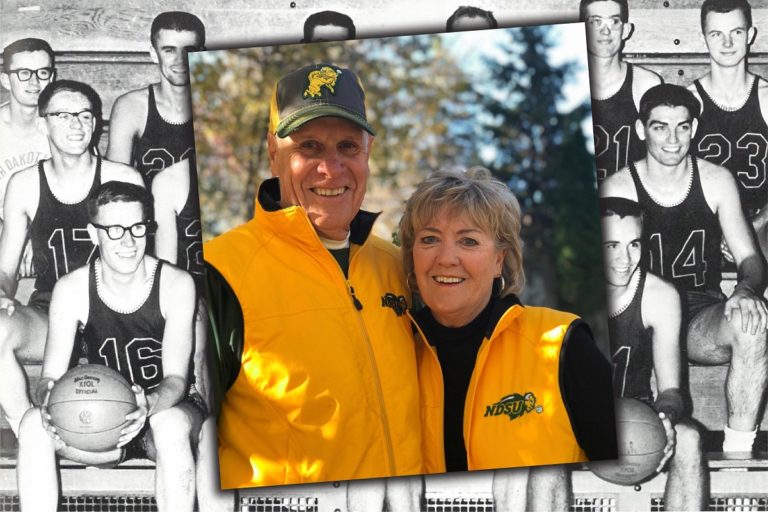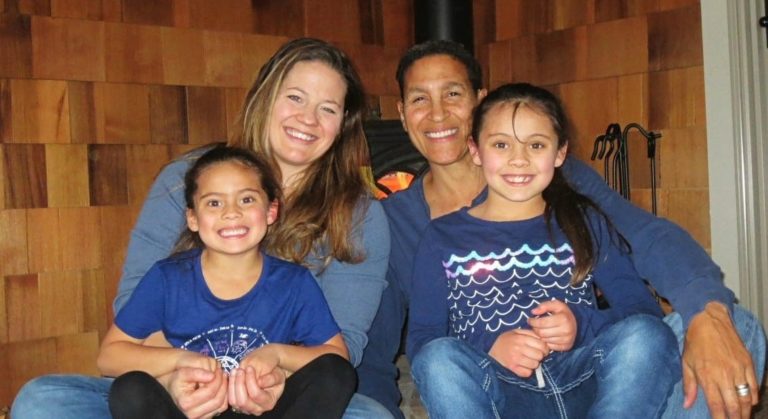Robert (Bob) '64, '70 and Suzanne '64 Lervick have always felt a special connection to Bison Athletics. Bob, a Life Trustee at...
Read MoreMaking an Assist
Two photos in the home of Dale Peppel '53 help tell the story of the role basketball played in shaping his childhood — and his future.
By Micaela Gerhardt | October 27, 2021

In 1916, Grace Peppel and her teammates won the Barnes County Girls Basketball Championship. Thirty-six years later, her son, Dale ’53, and his teammates from NDSU, won the North Central Conference Basketball Championship. A photo of each team — one from 1916 and one from 1952 — still hang in Dale’s home.
He and his brother, Donald, were toddlers when Grace — a single mother — moved back to North Dakota during the Great Depression. Many North Dakotans, especially in small towns, were struggling. Grace was fortunate enough to find a job as a telephone operator with Northwestern Bell in Fessenden.
She, Dale, and Donald lived in the telephone company house. The switchboard was in the front room, and Dale remembers her, in those days, as “the ‘Number, please?'” lady. They didn’t have a bathtub, hot water, or a car. When Dale and Donald were hungry, Grace told them to eat more bread.
“We didn’t really have much, but we were okay. We certainly survived,” Dale, who is now 90 years old, said, “Mom was a saint — she worked all the time.”
Still, Grace hardly ever missed the Fessenden High School basketball games on Tuesday and Friday nights. While Dale and his teammates sprinted up and down the court, Grace cheered from the balcony above the bleachers.
“Everybody in town was worried mom was going to fall over the railing because she got so excited at the games,” Dale said.
Despite Grace’s efforts, there wasn’t enough money in the family to send Dale or Donald to college. Donald, the elder of the two, didn’t seem to mind; he often said if it hadn’t been for sports, he wouldn’t have finished high school, and he enlisted in the Army as soon as he graduated.
As for Dale, he wasn’t looking too far ahead. He was busy, as many small-town athletes are, being involved in “everything,” including basketball, football, and baseball. But, as luck would have it, one of his high school coaches put in a good word for him with Howard Bliss, the head football coach at North Dakota State University (then NDAC). Coach Bliss invited Dale to come to NDSU and said if he participated in sports, he could offer Dale an on-campus job and a place to sleep.
"Those are the things you really remember: who you played with and who you became good, close friends with because you traveled with them, ate with them, practiced with them, and played with them."
Dale Peppel '53
In the fall of 1949, Dale arrived at NDSU and made his home in the basement of Churchill Hall in a room he shared with about fifteen other student-athletes — many of whom, like Dale, were football and basketball players. Casey Finnegan, the athletic director, lined Dale up with a job in the Ceres Hall cafeteria.
“I got my breakfast, lunch, and dinner there and put in my time washing pots and pans, sweeping the floor, and doing whatever they needed to have done,” Dale said.
He couldn’t have foreseen, then, that his industrial engineering degree from NDSU would help prepare him for a successful 43-year career with 3M, that his children, Tom and Mary, would both graduate from NDSU, or that in 1996, he and his wife, Beverly, would establish a scholarship endowment for men’s and women’s basketball student-athletes at NDSU.
“The reason I wanted to contribute [to NDSU] was the fact that I wouldn’t have the successes I’ve had in life without my education,” Dale said. “I’ve been able to raise a family and have a good life, so I just felt that if I could help somebody, that would be great.”
Dale wanted to help support basketball student-athletes because so many of his memories at NDSU revolve around his own experiences on the basketball team. Some of his teammates were also his roommates, and many became his closest friends.
“Those are the things you really remember: who you played with and who you became good, close friends with because you traveled with them, ate with them, practiced with them, and played with them.”
To this day, Dale still talks to his former roommate and teammate Grut Anderson. Both he and Grut played basketball and were offensive ends on the varsity football team their sophomore year. Their biggest rival, at the time, was the University of North Dakota.
“It wasn’t a friendly rivalry. I remember as a sophomore, we were playing UND, and I was trying to block this linebacker. He must’ve been an ex-G.I. because he wasn’t a young guy at all. He hit me so hard on the head I saw stars!” Dale said.
Dale was 6’2″ and about 178 lbs. during his time as a student-athlete, and Grut was about the same. At the end of their sophomore season, Coach Bentson approached them and told them they needed to make a choice between football and basketball, since both programs were going to have spring practices.
“We both said, ‘No question about it — we’ll play spring basketball,'” Dale said, laughing. Although he says neither the football nor basketball teams were the dominant force the Bison are today, there was still super talent.
“We had the Fercho twins, and Don Fougner from Williston, Grut Anderson from Hillsboro, Bob Lauf, and our captain, Art Bunker — just really good ball players,” Dale said, and added, laughing, “One thing I remember is the fact that we never got any individual coaching — we only had one coach — but I could’ve used some individual coaching!”
That one coach, Chuck Bentson, arrived at NDSU, from Wyoming, in the fall of 1949 — Dale’s freshman year — and eventually became the longest-serving coach in NDSU history. The Bentson-Bunker Fieldhouse on campus is named for Bentson and Art Bunker, another one of Dale’s teammates who also gave back to the University.

When asked to describe Bentson, Dale paused, and then the memories came flooding back.
“Bentson was an ex-Marine. He brought ‘the weave’ to NDSU — a fast-moving dribble and passing exchange across the front court, behind the free-throw circle. He wasn’t a big guy, and I don’t think I ever heard Bentson tell a joke,” Dale said. “He was strict; although, he never dressed anybody down. He was very much dedicated to basketball and the games.”
Guided by Coach Bentson, Dale and his teammates won the North Central Conference Championship in 1952. The ’52 NDSU Annual states, “The 1951-52 season was one of the best in [NDSU’s] history, and our first basketball championship since 1942.”
As an alumnus, Dale still takes a lot of pride in Bison Athletics. He’s impressed by their success in competitions but also by the efforts of student-athletes to study, make up for missed classes, and maintain high grade-point averages year-round.
“When NDSU selects recruits, they’re not only looking at athletic ability, but also their ability to do well academically,” Dale said. “I’m most impressed with the sports programs and student-athletes’ grade point averages. I’ve also been at scholarship endowment luncheons, so I’ve had the chance to have lunch with some of the basketball and football players, and they are just fine people.”
_____
If you would like to contribute to the Dale E. Peppel and Beverly Peppel Athletic Scholarship Endowment or receive information on how to fund your own endowment, contact Jack Maughan, NDSU senior associate athletic director, at 701.231.8984 or Stefanie Kelly, director of athletic development, Twin Cities, at 612.270.6171.
North Dakota taxpayers are eligible for a 40% state tax credit for contributions to an existing endowment or upon establishing an endowment.
In Our Hands: The Campaign for North Dakota State University, has raised nearly $440 million dollars for student scholarships, faculty research, student-focused programs, and facilities. You can make your gift to help enhance the NDSU experience at InOurHandsNDSU.com. The campaign will conclude Dec. 31, 2021.
Share This Story
Related Stories
A Privilege to Play
Edie Boyer '89 hardly remembers a time in her life without sports. Growing up, she and her three brothers and two sisters...
Read More
